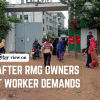Factory shutdown an ominous sign

We are deeply concerned to see production come to a halt at a number of factories due to workers' protests over the past few days. Reportedly, production remained suspended at some 10 ready-made garment (RMG) and 20 pharmaceutical factories on Saturday and Sunday as factory workers staged demonstrations to press home various demands. Assurances of fulfilment of logical demands have thus far failed to dissuade them from demonstrating. This is a troubling turn of events, especially when the country is going through a critical phase of political and economic transition.
Workers have been demonstrating in Savar, Ashulia, Dhamrai and Gazipur areas with demands ranging from job regularisation, pay raise, and lunch allowance to two-day weekly holiday and attendance bonus. Several factory owners said that even though they had sat with the protesters and assured them of fulfilling their demands, the latter continued protests. A top official of a pharmaceutical company said that workers had given 24 hours to fulfil all their demands, even though doing so is not possible in such a short period of time. Several owners also said they shut down their facilities to avoid possible untoward incidents. Meanwhile, workers of an RMG factory said the authorities closed down the facility without clarifying whether their demands would be met.
On Monday, 30 RMG factories in Ashulia were shut down amid protests by job-seekers who demanded "proportional" recruitment of men and women at the factories. RMG industry insiders told The Business Standard that "outsiders" were trying to instigate the workers to create unrest in industrial hubs, taking advantage of the still fragile law and order situation in the country.
This is deeply distressing. We expect factory owners to address the genuine grievances of workers on a priority basis, but agitating workers, too, must understand the gravity of the situation. Suspension of production, especially of export products, has long-term consequences for our export-driven economy. Supply chain disruptions may lead to loss of business, which will surely affect our export earnings. If this situation persists, Bangladesh's image will be further tarnished, and investors, both domestic and foreign, may further lose confidence. We simply cannot afford that right now.
We urge the interim government to send out a clear statement condemning the ongoing unrest, and take steps to ensure safety at the factories and restore the confidence of industrialists. Already, businesses have paid a heavy price, thanks to the politically motivated attacks on industrial units following the fall of the Sheikh Hasina government on August 5. We cannot have further disruptions. We also urge the workers to not force unrealistic demands upon factory owners, and pursue peaceful means to engage with the latter. If factories remain shut, their jobs will be jeopardised too. Instead of occupying the streets—which has been causing considerable public suffering—they must pursue dialogue through trade unions and workers' rights bodies. The factory owners, too, must fulfil their legitimate demands as soon as possible.

 For all latest news, follow The Daily Star's Google News channel.
For all latest news, follow The Daily Star's Google News channel. 








Comments